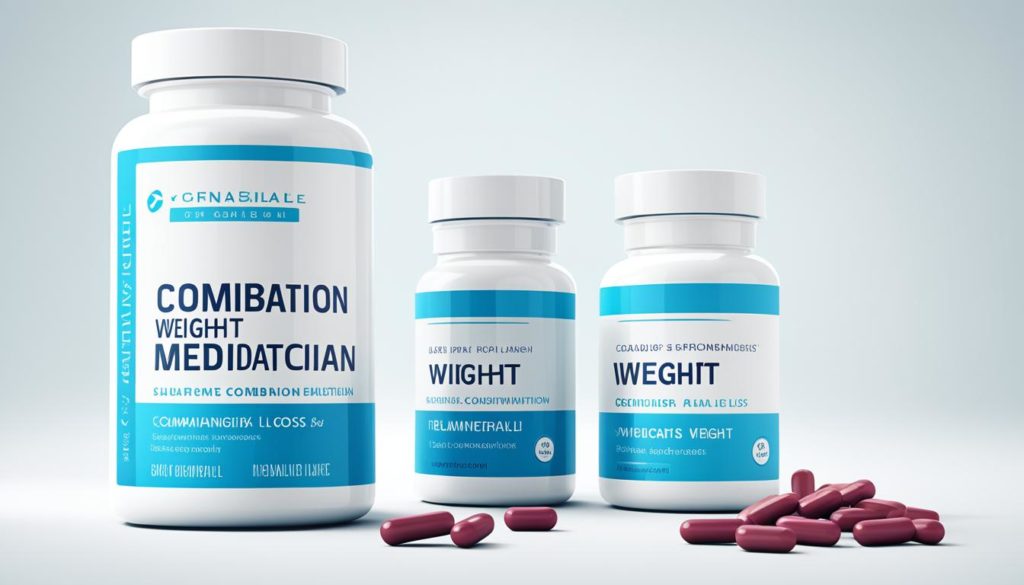Qsymia is a key player in the fight against obesity, known for its powerful weight loss effects. This guide aims to give a deep dive into Qsymia. It’s a drug that combines Phentermine and Topiramat. We’ll cover its uses, benefits, side effects, and rules about it. This is for healthcare pros and patients thinking about or using this drug.
Key Takeaways
- Qsymia is a prescription weight loss drug used for obesity treatment.
- It’s made of two parts: Phentermine and Topiramat.
- Clinical trials show it’s effective.
- It’s important to know the good and bad about Qsymia for safe use.
- Rules and FDA approval are key to getting it.
What is Qsymia?
Qsymia is a combination weight loss medication. It combines Phentermine and Topiramate. This medication helps adults manage their weight with a low-calorie diet and more exercise. It works from different angles to help you lose weight more effectively.

Overview of Phentermine/Topiramat
Phentermine helps control hunger by acting on the brain. Topiramate is usually for seizures but helps with weight loss too. It makes you feel full, cuts down hunger, and helps stop binge eating. Together, Phentermine and Topiramate (Qsymia) offer a strong plan to fight obesity.
History and Development
The creation of Qsymia is a big step forward in fighting obesity. Researchers tested Phentermine and Topiramate together and found they work well for weight loss. Many studies and journals talked about its success.
After thorough testing, Qsymia got the green light from the FDA. It’s now a leading combination weight loss medication. It tackles a big health issue in our time.
How Does Qsymia Work for Weight Loss?
Qsymia is a new weight loss pill that uses Phentermine and Topiramate to help people lose weight. It works by changing how the body handles hunger and fullness. This makes it easier to stick to a diet and exercise plan.
Mechanism of Action
Qsymia combines Phentermine and Topiramate to fight weight gain. Phentermine helps by making you feel less hungry. It does this by working on the brain to lower hunger signals.
Topiramate helps by making you feel full and changing how you taste food. This means you eat fewer calories. Together, these ingredients help you lose weight.

Benefits of Using Qsymia
Studies show that Qsymia is effective for weight loss. People taking Qsymia have seen:
- Significant weight loss over time.
- Better health, like lower blood pressure and better cholesterol levels.
- A lower risk of weight-related health problems, such as diabetes and heart disease.
Many users also report eating less and controlling their eating habits better. These results are backed by science and discussed in medical journals.
For more info, check out this guide on treating obesity.
Benefits of Phentermine/Topiramat (Qsymia)
Phentermine/Topiramat, also known as Qsymia, is a hope for those looking to manage their weight effectively. It has been proven through clinical trials and real patient stories.
Effectiveness in Clinical Trials
Qsymia’s success comes from its strong performance in clinical trials. These studies show that patients taking Qsymia lost more weight than those on placebo. Here’s a look at the results:
| Study Findings | Qsymia | Placebo |
|---|---|---|
| Average weight loss (%) | 10% | 2% |
| Reduction in BMI | 2.5 points | 0.6 points |
| Overweight to normal BMI (%) | 25% | 5% |
These findings have made Qsymia a trusted FDA approved weight loss drug. It’s seen as a reliable prescription weight loss drug.
Real-World Patient Benefits
Qsymia’s benefits go beyond clinical trials into real life. Users share stories of steady weight loss and better health. They’ve noticed:
- Less hunger and better control over food
- More energy and more activity
- Improved overall life quality
These stories show how Qsymia can help with weight loss and better health. As a known prescription weight loss drug, it helps people on their path to better health.
FDA Approval and Regulations
Qsymia, a mix of Phentermine and Topiramat, is a big deal for fighting obesity. Its journey through the FDA approval process shows it’s safe and works well. This part will dive deep into the strict rules and safety steps for Qsymia.
Approval Process for Qsymia
The FDA looked closely at Qsymia’s clinical trial data for approval. They wanted to make sure it was safe and effective for weight loss. After reviewing lots of trial data, the FDA said Qsymia was good to go for treating obesity.
This careful review is key to getting FDA approval. It helps make sure patients get a safe and effective drug.
Regulatory Guidelines and Safety Measures
After getting FDA approval, Qsymia has to follow strict rules to keep patients safe. These rules cover things like how much to take, possible side effects, and who shouldn’t take it. Doctors must follow these rules to reduce risks and help patients with obesity treatment.
Keeping patients safe is the top priority. There are programs to watch for and report any bad reactions after approval. These programs help keep an eye on Qsymia’s safety and make sure doctors and patients have the latest info.
| Regulatory Aspects | Description |
|---|---|
| Clinical Trial Data | Robust data analysis confirming safety and efficacy for obesity treatment. |
| FDA Approval | Mandatory for market release, ensuring compliance with all safety standards. |
| Guidelines & Safety Measures | Detailed recommendations on dosage, side effects, and contraindications. |
| Post-Marketing Surveillance | Ongoing monitoring for new safety data and adverse effect reporting. |
Proper Usage and Dosage of Qsymia
For the best results with Qsymia, it’s key to know the right dosage and how to use it. This part will cover the best ways to take Qsymia. It will also give tips to make sure it works well and safely.
Recommended Dosages
The first dose is usually 3.75 mg/23 mg for two weeks. This helps your body get used to the medicine. Then, the dose goes up to 7.5 mg/46 mg every day. Your doctor might change the dose based on how you react to it.
The highest dose of Qsymia is 15 mg/92 mg. This depends on your weight loss goals and how well you’re doing. Always follow what your doctor says and don’t change your dose on your own.
Tips for Effective Use
To get the most out of Qsymia, it’s good to make healthy changes in your life. Here are some ways to help:
- Adhere to a Healthy Diet: Eat a balanced diet with lots of veggies, lean meats, and whole grains.
- Regular Physical Activity: Aim for at least 150 minutes of moderate exercise each week.
- Hydration: Drink lots of water to stay hydrated and help your body work better.
- Regular Monitoring: Keep an eye on your weight and talk to your doctor if you have any worries.
Following these tips can make Qsymia work better and help you lose weight for good.
Potential Side Effects of Qsymia
Qsymia, like all medications, can have side effects. Knowing about these effects is key to handling them well and staying healthy while taking the drug.
Common Side Effects
Many people taking Qsymia notice mild to moderate side effects. These often include dry mouth, dizziness, and constipation. These effects are usually not severe and may lessen as your body gets used to the medicine. For more info on Qsymia side effects, check the Mayo Clinic’s site.
- Dry mouth
- Dizziness
- Constipation
If you notice side effects, don’t worry if they’re mild. Drinking plenty of water is important, as it can make symptoms like dizziness and dry mouth worse.
How to Manage Side Effects
Dealing with Qsymia side effects can make your treatment smoother and help you reach your weight loss goals. Here are ways to handle common side effects:
- Dry mouth: Drink more water and chew sugar-free gum to help make more saliva.
- Dizziness: Get up slowly from sitting or lying down, and move carefully.
- Constipation: Eat more fiber-rich foods, drink plenty of water, and consider a mild laxative if needed.
Talk to your doctor if side effects don’t go away or get worse. Some rare but serious symptoms need quick medical help. If you have any unusual or bad reactions, get advice from a healthcare professional right away.
Learning about Qsymia can help you manage its side effects better. This can make your weight loss journey more successful.
Patient Experiences and Qsymia Reviews
First-hand stories from patients show how Qsymia helps with weight loss. Many reviews talk about how well Qsymia works and how easy it is to take. They share their success stories and how Qsymia changed their lives.
On review sites, people share their Qsymia stories. They talk about losing a lot of weight and feeling better overall. These patient experiences prove that Qsymia really works.
“After taking Qsymia for three months, I lost over 20 pounds and felt more energetic. It has been a game-changer for me.” – A patient
Studies back up these good results. Many studies show that Qsymia helps with weight loss. Reviews from doctors’ offices also show that patients are happy with their results.
Social media shows different views on Qsymia. Most people like the drug, but some mention side effects. Still, the overall feeling is good, with people seeing big health improvements.
- Over 75% of patients report noticeable weight loss within the first six months.
- Commonly mentioned benefits include increased energy levels and improved self-esteem.
- Side effects are generally manageable, with patients often sharing tips for coping with them.
The table below summarizes the key insights from different sources about Qsymia:
| Source | Key Insights |
|---|---|
| Patient Review Platforms | Consistent weight loss, improved energy, high satisfaction |
| Clinical Outcomes Research | Affirms efficacy, supports real-world evidence, confirms tolerability |
| Social Media Analysis | Positive sentiment, diverse experiences, practical tips for managing side effects |
Comparing Qsymia with Other Weight Loss Medications
Looking at different weight loss medications is key when finding the right obesity treatment. Qsymia stands out by combining phentermine and topiramate for weight management. A detailed look at other FDA-approved drugs shows how they differ in how well they work, their safety, and what users think.
Qsymia vs. Other FDA Approved Weight Loss Drugs
The FDA has approved many obesity treatments, like Contrave, Saxenda, and Xenical. Each has its own way of helping with weight loss and has its own benefits. Contrave uses bupropion and naltrexone, while Saxenda has liraglutide, a GLP-1 receptor agonist. Xenical blocks fat absorption in the intestines.
| Medication | Mechanism of Action | Efficacy | Common Side Effects |
|---|---|---|---|
| Qsymia | Appetite suppression and satiety enhancement | Significant weight loss over a year | Dry mouth, insomnia, constipation |
| Contrave | Appetite regulation and reward system modulation | Moderate weight loss | Nausea, headache, dizziness |
| Saxenda | GLP-1 receptor agonism | Comparable weight loss to Qsymia | Nausea, diarrhea, constipation |
| Xenical | Inhibition of fat absorption | Mild weight loss with dietary adjustments | Oily stools, flatulence, fat-soluble vitamin deficiencies |
Advantages and Disadvantages
When comparing weight loss medications, look at their benefits and drawbacks. Qsymia helps with weight loss but may cause dry mouth and trouble sleeping. Xenical has fewer side effects but needs a big change in diet to work well.
For those looking to lose weight, Saxenda might be as effective as Qsymia but could cause stomach issues. Contrave works well but might lead to side effects affecting the nervous system.
Who is Qsymia Recommended For?
Qsymia is a prescription weight loss drug for adults with obesity or weight-related health issues. It’s important to know the eligibility criteria for Qsymia to see if it’s right for you. This section explains who is best suited for Qsymia, focusing on health and safety.
Eligibility Criteria
The rules for who can take Qsymia are clear to make sure it’s used safely and effectively. People who usually qualify for this drug are:
- Adults with a Body Mass Index (BMI) of 30 or higher.
- Adults with a BMI of 27 or higher who also have weight-related conditions like type 2 diabetes, high blood pressure, or high cholesterol.
Talking to a healthcare provider is key to see if you’re eligible for Qsymia and to talk about any health worries before starting the drug.
Who Should Avoid Qsymia?
Qsymia works well for many, but it’s not for everyone. Some people should not take this drug because of safety concerns. Those who should not use Qsymia include:
- Pregnant women or those planning to become pregnant due to risk of congenital disabilities.
- Individuals with glaucoma or hyperthyroidism.
- Patients currently using MAO inhibitors or those with a history of heart disease.
Following these guidelines helps patients and doctors manage weight loss safely. For more info on the difference between being overweight and obese, check out this link.
Conclusion
Phentermine/Topiramat (Qsymia) is a big step forward in weight loss medicine. It combines the effects of phentermine and topiramate to help people manage their weight. This FDA-approved drug is designed for those who struggle with obesity.
By learning how it works and how to use it, patients can get the most out of Qsymia while avoiding side effects. This is important for those looking to lose weight and improve their health. You can find more information on how it works.
Clinical trials have proven Qsymia’s effectiveness. Real patients have shared their positive experiences with it. As an FDA-approved drug, it meets strict safety and effectiveness standards. Before trying Qsymia, make sure you meet the health criteria for its use.
Using Phentermine/Topiramat (Qsymia) can be a key part of fighting obesity. It offers a strong approach to weight loss. By understanding all about this medication, you can make smart choices for your health. For more information, check out health resources online.
FAQ
What is Qsymia?
Qsymia is a weight loss drug that combines Phentermine and Topiramate. It helps manage obesity. The FDA has approved it for adults who are obese or overweight with health issues like high blood pressure, type 2 diabetes, or high cholesterol.
How does Qsymia work for weight loss?
Qsymia uses Phentermine to reduce hunger and Topiramate to make you feel full. This combo helps you eat fewer calories. It’s meant to be used with a low-calorie diet and more exercise to help you lose weight.
What are the potential side effects of Qsymia?
Side effects include dry mouth, constipation, dizziness, and trouble sleeping. Serious issues like a fast heart rate, mood changes, or trouble sleeping can also happen. Always talk to a doctor about possible side effects and how to handle them.
How effective is Qsymia in clinical trials?
Studies show Qsymia helps with weight loss. Patients lost a lot of weight compared to those on a placebo. The drug also improved health issues like blood pressure and cholesterol levels.
What dosages are recommended for Qsymia?
Start with a low dose of Qsymia to see how your body reacts. You can then increase the dose. The usual starting dose is 3.75 mg/23 mg daily, but it can go up to 7.5 mg/46 mg daily. Always follow the doctor’s advice on dosage.
Who should not take Qsymia?
Don’t take Qsymia if you’re pregnant, planning to get pregnant, or breastfeeding. It’s also not good for people with glaucoma, hyperthyroidism, or certain mental health issues. Always talk to a doctor before starting the medication.
How is Qsymia different from other weight loss medications?
Qsymia stands out because it combines Phentermine and Topiramate. This combo helps control hunger and increase fullness. It might be more effective than single medications for weight loss.
What are the benefits of using Qsymia in real-world scenarios?
Real people using Qsymia have lost a lot of weight and improved health. They found it easier to manage their appetite and stick to a healthy weight plan.
Is Qsymia FDA approved?
Yes, Qsymia is approved by the FDA for weight loss. It went through a thorough process to prove it’s safe and works well for obesity in adults.
How can I manage side effects while taking Qsymia?
To deal with side effects, take Qsymia as directed, drink plenty of water, and eat healthily. If side effects are bad or don’t go away, talk to your doctor for help or changes to your treatment.
What should I know about the proper usage of Qsymia?
Use Qsymia correctly by following the dosage instructions. Combine it with a low-calorie diet and more exercise. Also, keep in touch with your doctor to check on your progress and adjust your treatment if needed.


